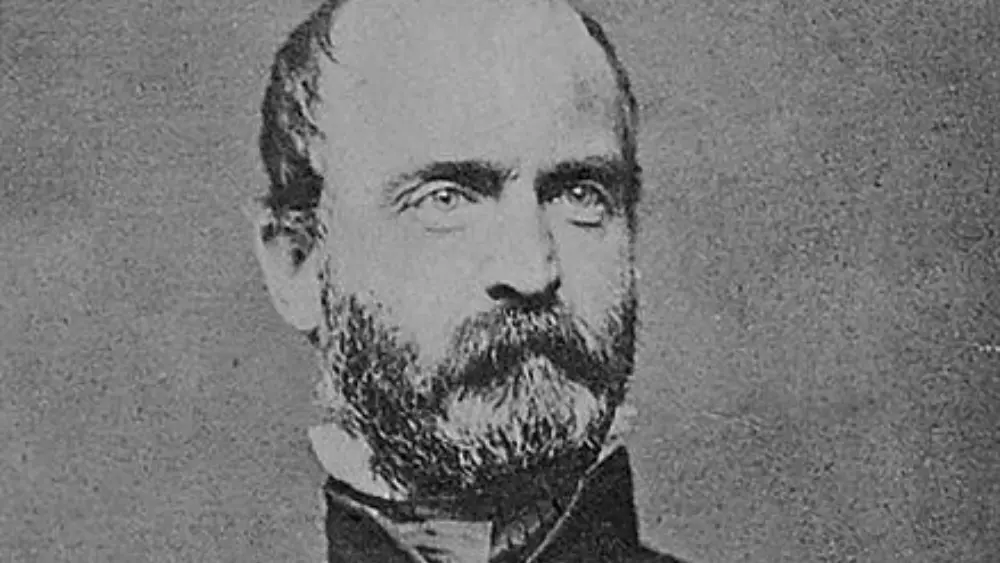Lewis Addison Armistead, born on February 18, 1817, in New Bern, North Carolina, was a career officer in the United States Army who became one of the most memorable figures of the American Civil War. His life was marked by duty, divided loyalties, enduring friendships, and a noble sacrifice on the battlefield. Torn between his allegiance to the Union and the call of his home state, Virginia, Armistead’s life encapsulates the tragic human cost of civil war. His story is one of honor, heartbreak, and the enduring bonds of brotherhood formed through military service.
Early Life and Military Service
Lewis Armistead came from a deeply patriotic and military-rooted family. His father, Walker Keith Armistead, was a respected officer who served in the War of 1812 and later became the Chief of Engineers for the U.S. Army. His uncle, George Armistead, was the famed defender of Fort McHenry during the British attack that inspired Francis Scott Key to write “The Star-Spangled Banner.” It was no surprise that Lewis Armistead, growing up in such a distinguished household, would follow in the footsteps of his forebears.
Armistead’s military journey began when he enrolled at the United States Military Academy at West Point in 1833. He struggled academically and ultimately resigned after an incident with a fellow cadet, but his military potential remained undeniable. With the support of family connections and the recognition of his character, he received a commission in the U.S. Army in 1839. This marked the beginning of a long and eventful career in military service.
Early Military Career and Service in Florida
After entering the Army, Armistead quickly proved himself capable in the field. One of his early assignments brought him to the challenging and swamp-laden battlefields of Florida during the Second Seminole War. The terrain was difficult, the enemy elusive, and disease rampant—an ideal proving ground for young officers. It was here that Armistead learned the discipline, endurance, and leadership that would define his military approach.
These early postings also reflected the broader patterns of U.S. expansion and conflict during the 19th century. As American forces pushed westward and southward, officers like Armistead found themselves in constant motion, gaining vital field experience but also forging the close interpersonal bonds that would later define his legacy.
Lewis Armistead: Valor in the Mexican-American War
The Mexican-American War (1846–1848) was a turning point in Armistead’s career. During this campaign, he distinguished himself through his courage under fire and tactical competence. Serving with distinction, Armistead earned the respect of both superiors and peers. Armistead took a bullet to the shoulder during the Battle of Chapultepec, one of the war’s most significant engagements. This injury would plague him for years, but it also symbolized his devotion to duty and his willingness to sacrifice for his country.
It was during this war that Armistead formed some of his most lasting friendships with fellow officers—many of whom, like him, would later face the heartbreaking decision of choosing sides in the Civil War. Among these friendships, his bond with Winfield Scott Hancock stood out. This war’s shared hardships and victories forged a tight-knit brotherhood of military officers whose loyalties would face unimaginable tests.
The Brotherhood of War: Friendship with Winfield Scott Hancock
The years between the Mexican-American War and the Civil War were relatively quiet for Armistead, but they were crucial for the development of relationships that would later become historically significant. One of the most poignant aspects of Armistead’s story is his enduring friendship with Union General Winfield Scott Hancock. They forged their bond during the Mexican-American War and strengthened it over decades of shared experiences in the U.S. Army.
In 1861, when secession gripped the South and the Civil War loomed, Armistead, like many Southern officers, faced a soul-wrenching decision. He deeply loved the United States and had dedicated over two decades of his life to its service. But his heart remained tied to Virginia. Ultimately, he resigned his U.S. commission and joined the Confederate cause.
Before leaving California to return east and join the Confederacy, Armistead made a tearful farewell to Hancock and his wife. It’s said that he left behind personal items in Hancock’s care, including photographs and family mementos. He reportedly said, “Hancock, do the best you can for my family if I fall.” These words, heavy with premonition and heartbreak, symbolized the emotional pain caused by a divided nation and the bonds of brotherhood stretched to their limits.
Civil War Service and Rise to Brigadier General
After joining the Confederate Army, Armistead quickly rose to the rank of brigadier general. He commanded a brigade in George Pickett’s division of the Army of Northern Virginia under General Robert E. Lee. Though older than many of his peers, Armistead brought a steady hand, battlefield experience, and a commanding presence to his troops.
Armistead’s leadership during the Peninsula Campaign and at battles like Seven Pines and Malvern Hill proved his tactical skill. But it was at the Battle of Gettysburg, in July 1863, that his name would be forever etched in American history. This clash would become one of the Civil War’s most pivotal and blood-soaked confrontations—and the setting for Armistead’s ultimate sacrifice.
The Battle of Gettysburg and Pickett’s Charge
On July 3, 1863, the third and final day of the Battle of Gettysburg, General Robert E. Lee ordered a massive assault on the center of the Union line at Cemetery Ridge. This assault—now known as Pickett’s Charge—was to be led by three Confederate divisions, including Armistead’s brigade.
As the charge began, Armistead rode in front of his men, hat raised high on the tip of his sword, shouting encouragement and urging his troops forward. Under blistering cannon and rifle fire, Armistead’s brigade advanced across open fields, enduring immense casualties. Despite the overwhelming odds, his men reached the Union line at a stone wall near what is now called the “High Water Mark of the Confederacy.”
Armistead and his men briefly breached the Union position, but enemy forces quickly overwhelmed their effort. As he crossed the stone wall, multiple bullets struck Armistead in the arm and leg. He collapsed, mortally wounded. Nearby Union soldiers, realizing who he was, carried him to a field hospital. According to some accounts, a Union officer—possibly a member of Hancock’s staff—stood by his side.

Death, Burial, and Reconciliation
Lewis Armistead died on July 5, 1863, two days after the failed charge. His death marked not just the end of a life but the symbolic breaking of a bond between former brothers-in-arms. His final moments were reportedly filled with regret—not for choosing Virginia, but for the devastation that war had brought upon friends, families, and the nation.
Ironically, Armistead was buried in a Union cemetery in Baltimore, Maryland. This burial in Union soil served as a poetic conclusion to a life torn between allegiances. It also reflected a subtle, early gesture toward the reconciliation that would take decades to realize after the war’s end.
His interment in the North, not far from where his dear friend Hancock would one day be laid to rest, is a reminder that personal bonds often transcend the political and military divisions of their time.
Lewis Armistead’s Enduring Legacy
Armistead’s legacy is complex yet deeply human. He is remembered as a man of courage and conviction, who upheld his values even when they placed him on the opposite side of close friends and colleagues. His story is a powerful representation of the emotional and moral turmoil faced by many officers during the Civil War—a war not just of armies, but of families, friendships, and ideologies.
Beyond his military accomplishments, Armistead’s enduring image remains tied to the dramatic events at Gettysburg and the raw humanity they revealed. He symbolizes the tragedy of civil conflict—of brother fighting brother, and of noble men forced into impossible choices.
Today, visitors to Gettysburg can see the “High Water Mark” monument, which marks the furthest point reached by Confederate forces during Pickett’s Charge. Near that spot stands a statue of Armistead with his hat raised high on his sword, charging forward—a tribute to his bravery and determination.
But perhaps more importantly, his memory lives on in the countless retellings of his friendship with Hancock—a narrative that continues to resonate with themes of loyalty, sacrifice, and reconciliation. Michael Shaara immortalized their story in his Pulitzer Prize–winning novel The Killer Angels and its film adaptation, Gettysburg, bringing their bond and heartbreak to new generations.
Conclusion: A Life That Bridged a Divided Nation
Lewis Addison Armistead’s life tells the story of a soldier caught in the tides of national division but anchored by personal integrity and brotherhood. His valor at Gettysburg, his deep friendships, and his final sacrifice reflect the broader tragedy of a nation at war with itself.
Though he chose the Confederate cause, Armistead never abandoned the values of duty and honor instilled in him from youth. His ability to lead with courage while maintaining bonds of affection for those on the other side of the battlefield makes his story one of the most compelling in Civil War history.
As America continues to grapple with its past and seeks unity in the face of division, the life of Lewis Armistead stands as a poignant reminder that reconciliation, though painful, is both possible and necessary. In the legacy of Armistead, we find not just a Confederate general—but a human being who loved his friends, served his nation, and died with dignity.











